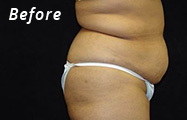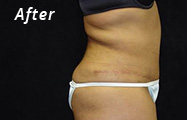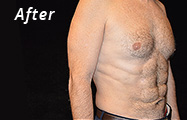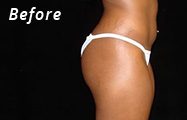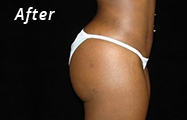Ear Surgery (Otoplasty)
Conveniently located to serve the areas of Baltimore, Columbia, Ellicott City and Maryland

Otoplasty is a cosmetic procedure that sets prominent ears back closer to the head or reduces the size of large ears. Protruding or misshapen ears can be a source of discomfort and insecurity for both children and adults. Otoplasty offers a surgical treatment option to address these concerns and provide a harmonious balance to the facial features. With meticulous attention to detail and a deep understanding of facial aesthetics, Dr. Daniel Markmann utilizes advanced techniques to create natural-looking results that enhance the overall harmony of the face.
During an otoplasty procedure, Dr. Markmann carefully repositions and reshapes the cartilage of the ear to sculpt a more balanced and proportionate appearance. The surgery can correct a range of concerns, including prominent ears, asymmetry, or any other aesthetic issues affecting the ears. By tailoring the approach to each patient’s unique needs and desires, Dr. Markmann ensures personalized and exceptional results.
If you are considering otoplasty to enhance your appearance and regain your self-assurance, we invite you to schedule a personal consultation with Dr. Markmann at our Ellicott City practice. Contact us at (410) 465-3600 or complete a simple form to book a personal consultation. Transform your ears and transform your life with the expertise and artistry of Dr. Markmann at Metamorphosis Plastic Surgery.
Contents
About the Ear
The human ear is an intricate and distinctive feature of our facial anatomy. While their primary function is to capture sound, the appearance of the ears can greatly impact a person’s self-confidence and overall aesthetic harmony.
Outer Ear Anatomy
- Pinna/Auricle – The pinna is the entirety of the visible outer ear. It is composed of cartilage and functions to funnel sound into the ear canal.
- Concha – Two parts of the pinna, the cymba and the cavum, make the concha; the angled portion of the ear closest to the opening of the ear canal.
- Helix – The helix is the cartilaginous outer rim of the pinna.
- Anti-Helix – Adjacent to the helix is the antihelix, a Y-shaped ridge curving outward from the deep concha.
- Lobule – The lobule is located at the bottom of the pinna. It has no cartilage, and is the most common piercing site for the placement of earrings.
Prominent Ears
For individuals with prominent or protruding ears, it is not uncommon to feel self-conscious or dissatisfied with their appearance. This condition, known as auricular prominence, or prominauris, can be present from birth or develop over time due to genetics, injury, or trauma. However, regardless of the cause, there is a solution available: otoplasty.
How Are Prominent Ears Diagnosed?
When diagnosing prominauris, doctors look at the angle distance between the pinna (the anatomical outer ear that catches sound) and the head, known as the auriculocephalic angle. The ideal range is within a 20 to 30-degree angle. The main reason for performing otoplasty is when the auriculocephalic angle is greater than 30 degrees. (1) Similarly, in cases of prominent ears the antihelix, concha, and the lobule often have distinct anatomical differences from the norm. (2)
Torn Earlobe Care
As well as for prominent ears, surgery may be indicated where there is a torn earlobe. This can occur with heavy earrings or through other trauma. The surgical repair of a torn earlobe is generally straightforward. The skin cleft between the two sides of the tear is removed, and using either a skin graft or donated cartilage, a new lobe is reconstructed. Sutures are used that are placed in both the front and back of the ear and will remain intact for several weeks. Several post-operative visits may be required so that the sutures can be removed in several phases to ensure the lobe is strong and aesthetically appealing.
Benefits of Otoplasty
- Enhanced Appearance
- Corrected Ear Deformities
- Balanced Facial Symmetry
- Increased Social Acceptance
- Improved Psychological Well-Being
- Improved Self-Confidence
- Long-Lasting Results
At Metamorphosis Plastic Surgery, Dr. Markmann’s dedication to patient satisfaction and his meticulous approach to otoplasty ensure that each individual receives personalized care and achieves their desired ear transformation. Contact our office at (410) 465-3600 to schedule a consultation and explore how otoplasty can benefit you.
Candidates for Otoplasty
For the most part, otoplasty operations are performed on children between the ages of 4 and 14. Ear surgery on adults is also possible, and there are generally no additional risks associated with ear surgery on an older patient. Otoplasty gives patients the confidence to show their face from any angle without anxiety about their ears.
The ideal candidate for otoplasty:
- Has prominent or protruding ears that affect their self-confidence.
- Has realistic expectations and understands the limitations of the procedure.
- Is in good physical health and does not have any underlying medical conditions that may impair healing.
- Is a non-smoker or is willing to quit smoking before and after the procedure, as smoking can negatively impact the healing process.
- Is at least five years old, as the ears have typically reached their adult size by this age.
Personal Consultation
During your comprehensive consultation, Dr. Markmann will take the time to understand your unique concerns and goals for cosmetic ear surgery. His expertise as an ear reshaping expert allows him to thoroughly assess your current ear structure and determine the most effective approach to achieve the most aesthetic results. He will evaluate the size, shape, proportion, and position of your ears in relation to your facial features, ensuring a harmonious and natural-looking outcome.
Dr. Markmann understands that each patient has specific needs and desires when it comes to ear correction. Whether you are seeking correction for prominent ears, torn earlobes, or other aesthetic concerns, Dr. Markmann will tailor a personalized treatment plan to address your unique situation.
Ear Surgery Procedure
Protruding Ear Surgery
During an otoplasty procedure, incisions are made behind the ear to reveal the ear’s confines. In cases of protruding ears, the cartilages are reformed and sometimes supported by splints. Soft tissues may also be trimmed away. The ears will be repositioned by tightening the skin. After this, they are permanently sutured.
In cases of hidden ears, when cartilages are not fully developed, manipulations may include reshaping the cartilages by pulling or repositioning while splints are placed as supports. Sometimes, tissue grafting is also necessary to render volume.
Recovery & Results
Otoplasties are performed with general anesthesia in an accredited surgical facility. It takes 1 to 2 hours to complete, and the patient will be sent home for recovery. The ear will be bandaged to keep the new position and shape in place. This also helps so that children cannot touch or play with their ears, which may complicate healing. Activities must be limited, especially within the first week.
Scars will remain hidden behind the ears or within the natural folds if the incisions are made in front of the ear.
How Much is Ear Surgery in Baltimore?
At our practice, we believe in providing transparent and accurate pricing information to our patients. During your personal consultation with Dr. Markmann, you will receive a detailed breakdown of the costs associated with your otoplasty surgery. This will help you make an informed decision about your aesthetic journey.
We understand that taking control of your appearance is an important investment in yourself. That is why we strive to offer competitive and affordable options for otoplasty procedures. Our team can also provide guidance on potential financing plans available to you, making your desired transformation more accessible.
To learn more about otoplasty or to schedule a consultation with Dr. Markmann, please contact our office at (410) 465-3600. We look forward to assisting you in attaining enhanced ear aesthetics.
Read more about aesthetic surgical procedures in Baltimore on Dr. Markman’s blog.
FAQ
How long do the results of otoplasty last?
The ears typically mature faster than any other part of the body, therefore, at an appropriate age and time when surgical adjustments are made, the results are generally long-lasting. Even as the body changes due to age and gravity, the changes to the ear will be minimal, and a secondary otoplasty is usually not needed.
When should a person have an otoplasty?
On average, 5 to 6-year-olds are ideal candidates for otoplasty as the ear will be already developed and the cartilage and tissues will still be soft, making it easy to reshape. This age is also recommended as it is a time before any schooling, which helps to avoid teasing.
Is ear surgery performed on one or both ears?
Usually, the condition is symmetrical to both ears. The final shape that the surgery will aim for will depend on the initial structure of the ear and how cartilages are placed. If the procedure is only for one ear, the shape will be patterned after the normally formed ear.
What are the risks and complications associated with otoplasty?
As with any surgical procedure, there are potential risks and complications associated with Otoplasty. These may include infection, bleeding, scarring, asymmetry, poor wound healing, changes in sensation, and dissatisfaction with the final results. However, by choosing a skilled and experienced plastic surgeon, the risks can be minimized, and appropriate measures can be taken to ensure a safe and successful outcome.
Are there any alternatives to otoplasty?
In some cases, non-surgical alternatives such as ear molding or temporary cosmetic techniques may be explored to correct minor ear irregularities. However, these options are typically limited in their effectiveness and may not provide permanent results. The most effective and long-lasting solution for prominent ear correction is otoplasty, as it addresses the underlying structural issues and produces lasting improvements.
References
- Kennedy KL, Katrib Z. Otoplasty. PubMed. Published 2021. https://www.ncbi.nlm.nih.gov/books/NBK538320/
- Naumann A. Otoplasty – techniques, characteristics and risks. GMS Current Topics in Otorhinolaryngology, Head and Neck Surgery. 2008;6:Doc04. https://www.ncbi.nlm.nih.gov/pmc/articles/PMC3199845/




.png)
